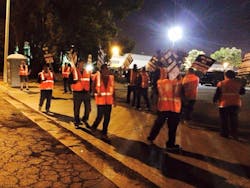Southern California port drivers strike to be reclassified as employees
Truck drivers who shuttle containers in and out of the twin ports of Los Angeles and Long Beach went on strike Monday, targeting four drayage companies and demanding to be classified as employees rather than contractors.
But while some recent California court decisions may support the drivers’ position, many in freight transportation are questioning the timing: The latest action comes as the West Coast is still trying to recover from freight bottlenecks that resulted from the prolonged labor negotiations between the International Longshore and Warehouse Union and the Pacific Maritime Assn.
“We had no choice but to go on strike again because my company is continuing to violate the law. The courts have ruled that I am an employee and that their illegal deductions from my paycheck must stop. But they keep fighting me so I am fighting back,” said Humberto Canales, a driver for Pacer Cartage, one of the targeted companies.
Other companies being struck were Intermodal Bridge Transport, Pacific 9 Transportation, and Harbor Rail Transport.
Picket lines went up at the company yards in the greater Los Angeles area and in San Diego, and truckers and their supporters also picketed company trucks at marine terminals, rail yards, and customer warehouses, according to the strike organizer, Justice for Port Truck Drivers.
However, port officials say the pickets have not substantially hampered operations.
“Dockworkers have reported to work and truckers have been able to enter and exit the affected terminals without delay,” said Jon Slangerup, CEO of the Port of Long Beach. “We do not expect that there will be any adverse impact to Port terminals or our ability to continue the outstanding progress that everyone has made in recent weeks to clear the congestion backlog and return to normal operations.”
Also Monday morning, the International Brotherhood of Teamsters Port Division and Green Fleet Systems LLC issued a joint statement explaining the company had avoided a strike by entering into “a comprehensive labor peace agreement designed to ensure that Green Fleet’s drivers have an opportunity to exercise their rights under the National Labor Relations Act and, if they choose, to select an exclusive representative for purpose of collective bargaining.”
The California Trucking Assn., which had strongly opposed previous port driver actions, is sitting this one out.
“The California Trucking Assn. represents a broad array of trucking companies that utilize different driver models,” CEO Shawn Yadon said in a statement. “We respect the right of each member company to decide for itself which model—employee based or independent owner operator—works best for its own operation.”
About the Author
Kevin Jones 1
Editor
Kevin has served as editor-in-chief of Trailer/Body Builders magazine since 2017—just the third editor in the magazine’s 60 years. He is also editorial director for Endeavor Business Media’s Commercial Vehicle group, which includes FleetOwner, Bulk Transporter, Refrigerated Transporter, American Trucker, and Fleet Maintenance magazines and websites.
